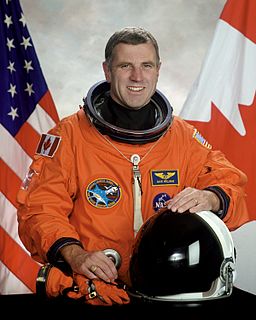A Quote by John Foley
Today it takes no great stretch of the imagination to envisage the earth as an interconnected globe humming with electronic transmissions - a chattering planet nestled in the provident silence of space. The ethical question is whether this is contributing to authentic human development and helping individuals and peoples to be true to their transcendent destiny.
Related Quotes
Going into orbit around Earth - where the space station is today, and where the space shuttles and John Glenn and all those folks go-that's three-eighths of an inch above a schoolroom globe, just FYI. That's not very far from Earth. Yes, you are off Earth, but you're not really going anywhere yet. The moon was the only real destination.
A new consciousness is developing which sees the earth as a single organism and recognizes that an organism at war with itself is doomed. We are one planet. One of the great revelations of the age of space exploration is the image of the earth finite and lonely, somehow vulnerable, bearing the entire human species through the oceans of space and time.
No matter what part of the world we come from, we are all basically the same human beings. We all seek happiness and try to avoid suffering. We have the same basic human needs and concerns. All of us human beings want freedom and the right to determine our own destiny as individuals and as peoples. That is human nature.
I think, actually, that it's a really fascinating time in history because the development of modern technology and the photographs the satellites were taking from space were mapping the earth in a new way, making us feel like the globe we inhabit is much smaller than previously conceived of, in the human mind.
One can see from space how the human race has changed the Earth. Nearly all of the available land has been cleared of forest and is now used for agriculture or urban development. The polar icecaps are shrinking and the desert areas are increasing. At night, the Earth is no longer dark, but large areas are lit up. All of this is evidence that human exploitation of the planet is reaching a critical limit. But human demands and expectations are ever-increasing. We cannot continue to pollute the atmosphere, poison the ocean and exhaust the land. There isn't any more available.
Ethical religion affirms the continuity of progress toward moral perfection. It affirms that the spiritual development of the human race cannot be prematurely cut off, either gradually or suddenly; that every stone of offence against which we stumble is a stepping-stone to some greater good; that, at the end of days, if we choose to put it so, or, rather, in some sphere beyond the world of space and time, all the rays of progress will be summed and centred in a transcendent focus.
On my second space walk, I was riding the Canadarm, heading down toward the payload bay of the space shuttle, and I could see the space shuttle highlighted against the Earth in the background, and there was this black, infinite, hostile void of space. I remember looking down at the Earth and thinking, "Beneath me is a 4½-billion-year-old planet, upon which the entire history of the human species has taken place." That was an incredibly humbling moment, and I had a bit of an epiphany.
Concern for the fate of the great rivers of the earth must lead us to reflect soberly on the model of development which our society is pursuing. A purely economic and technological understanding of progress, to the extent that it fails to acknowledge its intrinsic limitations and to take into consideration the integral good of humanity, will inevitably provoke negative consequences for individuals, peoples and creation itself.








































